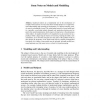Free Online Productivity Tools
i2Speak
i2Symbol
i2OCR
iTex2Img
iWeb2Print
iWeb2Shot
i2Type
iPdf2Split
iPdf2Merge
i2Bopomofo
i2Arabic
i2Style
i2Image
i2PDF
iLatex2Rtf
Sci2ools
135
click to vote
BIRTHDAY
2009
Springer
2009
Springer
Some Notes on Models and Modelling
Analytical models are a fundamental tool in the development of computer-based systems of every kind: their essential purpose is to support human understanding and reasoning in development. To support reasoning, models must be substantially formal. The relationship between a formal model and its--typically--non-formal subject demands care: particular attention must be paid to the model interpretation, which maps its formal terms to the phenomena of the subject. An analytical model is to be regarded not as an assertion, but as a predicate within a larger logical structure of reasoning. Analogical models, such as databases, act as run-time surrogates for some parts of the problem world; in their design the properties of the model itself must be carefully distinguished from those of its subject. Some models may be informal: informal models have many legitimate uses, but cannot serve as a basis for formal reasoning. 1 Modelling and Understanding The subject of these notes is the use of mode...
Related Content
| Added | 16 Feb 2011 |
| Updated | 16 Feb 2011 |
| Type | Journal |
| Year | 2009 |
| Where | BIRTHDAY |
| Authors | Michael Jackson |
Comments (0)

